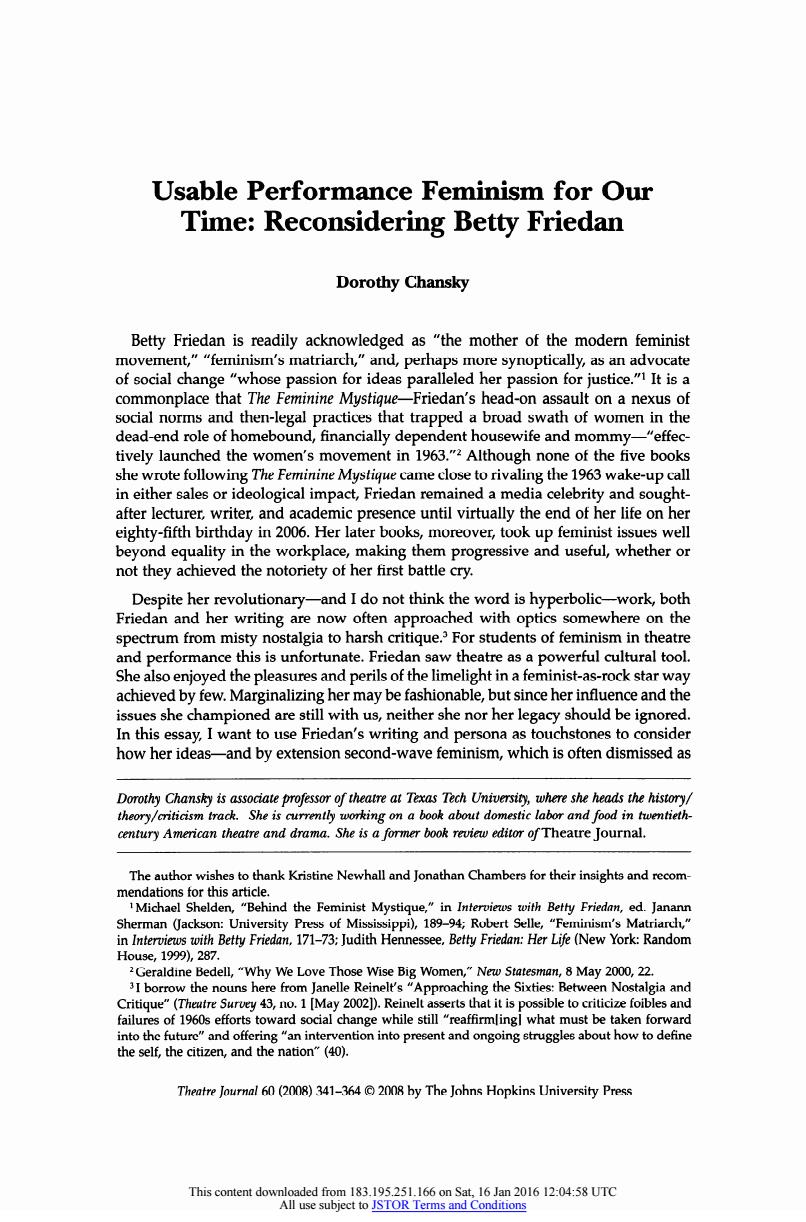正在加载图片...

Usable Performance Feminism for Our Time:Reconsidering Betty Friedan Dorothy Chansky Betty Friedan is readily acknowledged as "the mother of the modern feminist movement,""feminism's matriarch,"and,perhaps more synoptically,as an advocate of social change "whose passion for ideas paralleled her passion for justice."1 It is a commonplace that The Feminine Mystigue-Friedan's head-on assault on a nexus of social norms and then-legal practices that trapped a broad swath of women in the dead-end role of homebound,financially dependent housewife and mommy-"effec- tively launched the women's movement in 1963."2 Although none of the five books she wrote following The Feminine Mystique came close to rivaling the 1963 wake-up call in either sales or ideological impact,Friedan remained a media celebrity and sought- after lecturer,writer,and academic presence until virtually the end of her life on her eighty-fifth birthday in 2006.Her later books,moreover,took up feminist issues well beyond equality in the workplace,making them progressive and useful,whether or not they achieved the notoriety of her first battle cry. Despite her revolutionary-and I do not think the word is hyperbolic-work,both Friedan and her writing are now often approached with optics somewhere on the spectrum from misty nostalgia to harsh critique.?For students of feminism in theatre and performance this is unfortunate.Friedan saw theatre as a powerful cultural tool. She also enjoyed the pleasures and perils of the limelight in a feminist-as-rock star way achieved by few.Marginalizing her may be fashionable,but since her influence and the issues she championed are still with us,neither she nor her legacy should be ignored. In this essay,I want to use Friedan's writing and persona as touchstones to consider how her ideas-and by extension second-wave feminism,which is often dismissed as Dorothy Chansky is associate professor of theatre at Texas Tech University,where she heads the history/ theory/criticism track.She is currently working on a book about domestic labor and food in twentieth- century American theatre and drama.She is a former book review editor of Theatre Journal. The author wishes to thank Kristine Newhall and Jonathan Chambers for their insights and recom- mendations for this article. 1 Michael Shelden,"Behind the Feminist Mystique,"in Interviews with Betty Friedan,ed.Janann Sherman (Jackson:University Press of Mississippi),189-94;Robert Selle,"Feminism's Matriarch," in Interviews with Betty Friedan,171-73;Judith Hennessee,Betty Friedan:Her Life(New York:Random Hou3e,1999),287. 2Geraldine Bedell,"Why We Love Those Wise Big Women,"New Statesman,8 May 2000,22. 3I borrow the nouns here from Janelle Reinelt's "Approaching the Sixties:Between Nostalgia and Critique"(Theutre Survey 43,no.1 [May 2002]).Reinelt asserts that it is possible to criticize foibles and failures of 1960s efforts toward social change while still "reaffirmlingl what must be taken forward into the futurc"and offering"an intervention into present and ongoing struggles about how to define the self,the citizen,and the nation"(40). Theatre Journal 60(2008)341-364 @2008 by The Johns Hopkins University Press This content downloaded from 183.195.251.166 on Sat,16 Jan 2016 12:04:58 UTC All use subject to JSTOR Terms and ConditionsUsable Performance Feminism for Our Time: Reconsidering Betty Friedan Dorothy Chansky Betty Friedan is readily acknowledged as "the mother of the modern feminist movement," "feminism's matriarch," and, perhaps more synoptically, as an advocate of social change "whose passion for ideas paralleled her passion for justice."1 It is a commonplace that The Feminine Mystique - Friedan's head-on assault on a nexus of social norms and then-legal practices that trapped a broad swath of women in the dead-end role of homebound, financially dependent housewife and mommy - "effectively launched the women's movement in 1963."2 Although none of the five books she wrote following The Feminine Mystique came close to rivaling the 1963 wake-up call in either sales or ideological impact, Friedan remained a media celebrity and soughtafter lecturer, writer, and academic presence until virtually the end of her life on her eighty-fifth birthday in 2006. Her later books, moreover, took up feminist issues well beyond equality in the workplace, making them progressive and useful, whether or not they achieved the notoriety of her first battle cry. Despite her revolutionary - and I do not think the word is hyperbolic - work, both Friedan and her writing are now often approached with optics somewhere on the spectrum from misty nostalgia to harsh critique.3 For students of feminism in theatre and performance this is unfortunate. Friedan saw theatre as a powerful cultural tool. She also enjoyed the pleasures and perils of the limelight in a feminist-as-rock star way achieved by few. Marginalizing her may be fashionable, but since her influence and the issues she championed are still with us, neither she nor her legacy should be ignored. In this essay, I want to use Friedan's writing and persona as touchstones to consider how her ideas - and by extension second-wave feminism, which is often dismissed as Dorothy Chansky is associate professor of theatre at Texas Tech University, where she heads the history/ theory /criticism track. She is currently working on a book about domestic labor and food in twentiethcentury American theatre and drama. She is a former book review editor o/Theatre Journal. The author wishes to thank Kristine Newhall and Jonathan Chambers for their insights and recommendations for this article. 1 Michael Shelden, "Behind the Feminist Mystique/' in Interviews with Betty Friedan, ed. Janann Sherman (Jackson: University Press of Mississippi), 189-94; Robert Selle, "Feminism's Matriarch/' in Interviews with Betty Friedan, 171-73; Judith Hennessee, Betty Friedan: Her Life (New York: Random House, 1999), 287. 2Geraldine Bedell, "Why We Love Those Wise Big Women," New Statesman, 8 May 2000, 22. 3 1 borrow the nouns here from Janelle Reinelt's "Approaching the Sixties: Between Nostalgia and Critique" (Theatre Survey 43, no. 1 [May 2002]). Reinelt asserts that it is possible to criticize foibles and failures of 1960s efforts toward social change while still "reaffirm[ing] what must be taken forward into the future" and offering "an intervention into present and ongoing struggles about how to define the self, the citizen, and the nation" (40). Theatre Journal 60 (2008) 341-364 © 2008 by The Johns Hopkins University Press This content downloaded from 183.195.251.166 on Sat, 16 Jan 2016 12:04:58 UTC All use subject to JSTOR Terms and Conditions